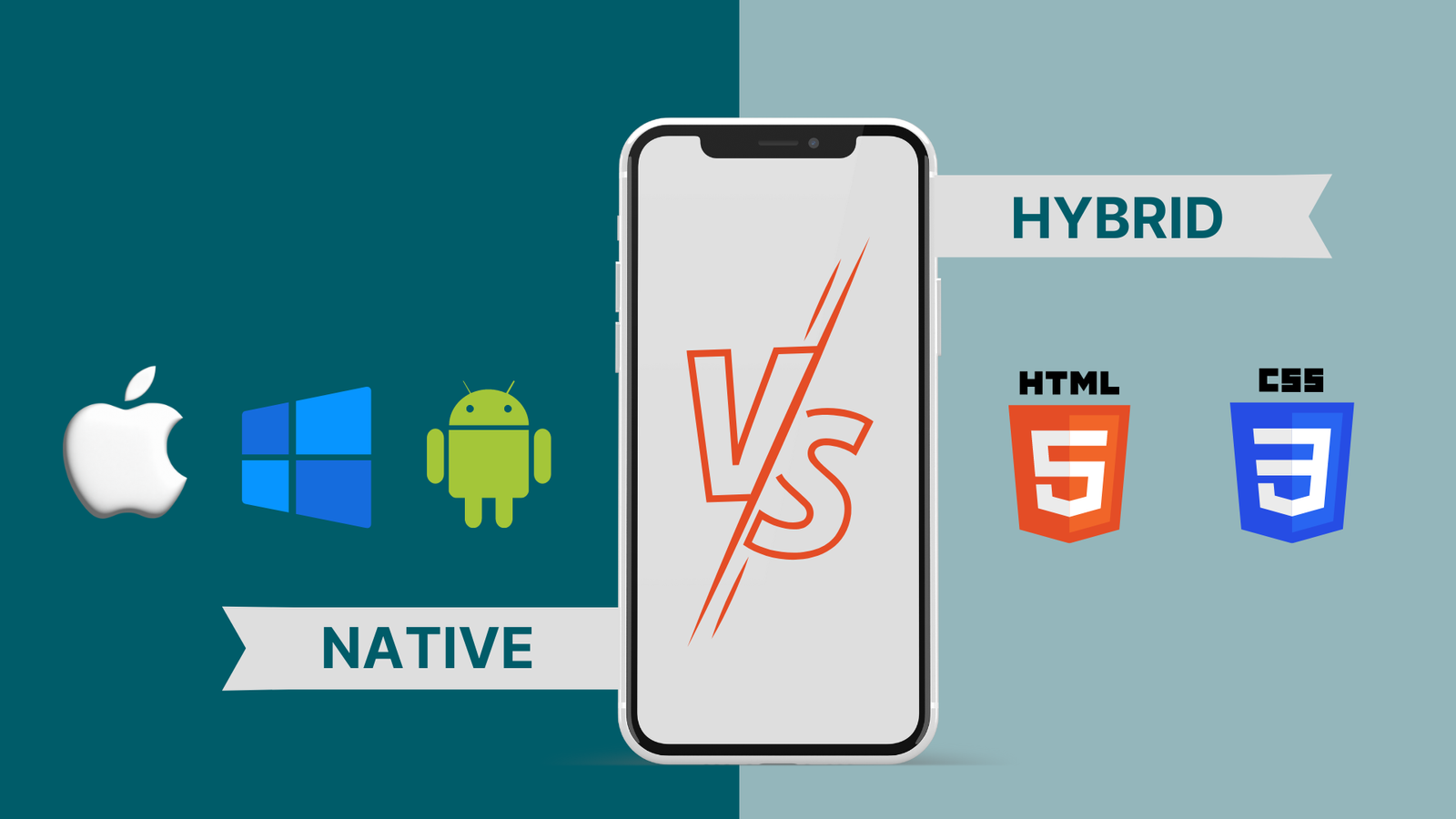Home » Hybrid vs. Native App Development: Choosing the Right Approach for Your Business

Mobile apps are vital for businesses to engage customers, enhance brand recognition, and streamline operations in the digital era. As mobile devices continue to grow in popularity, hybrid vs. native app development has become a top priority for companies across industries. However, with various development approaches available, choosing the right one that aligns with your business goals and budget is crucial.
Two popular options for mobile app development are hybrid and native app development. Each approach has its advantages and considerations. This article explores the differences between the two and helps you decide which is best for your business.
Hybrid app development combines HTML, CSS, and JavaScript to create cross-platform applications for iOS and Android.
One of the primary benefits of hybrid app development is its cost-effectiveness. A single codebase saves businesses time and costs by eliminating the need for separate iOS and Android development teams. Moreover, the ability to reuse code across platforms significantly reduces the required effort, resulting in cost savings.
Hybrid apps also provide cross-platform compatibility, allowing companies to reach a broader audience with a single application. This simplifies maintenance since updates and bug fixes can be deployed simultaneously across platforms. Additionally, businesses can leverage web technologies and existing web development skills to build hybrid apps, further streamlining the development process.
Get free Consultation and let us know your project idea to turn into an amazing digital product.
Hybrid app development uses HTML, CSS, and JavaScript to create cross-platform applications for iOS and Android. This allows hybrid apps to access device functionalities like the camera, contacts, and geolocation.
The main advantage of hybrid app development is its ability to save time and resources by utilizing a single codebase for multiple platforms. hire hybrid Developers can write code once and deploy the app on different devices, which reduces development effort and speeds up the time to market. However, hybrid apps may not offer the same level of performance and user experience as native apps specifically designed for a particular platform. Native apps are typically faster and have better access to device-specific features.
Due to its advantages, hybrid mobile app development is a preferred choice for many businesses and hire developers. Here are some of the key benefits that make this approach a standout option:
Using hybrid app development, you can create a single app operating on multiple platforms. This eliminates the need for investing in separate development teams or resources for each forum, leading to considerable cost savings compared to native app development.

Using web technologies like HTML, CSS, and JavaScript to create hybrid apps and then putting them in a native container is an intelligent move. By doing so, you can ensure that the app functions seamlessly on multiple platforms, including iOS, Android, and desktop platforms, without requiring distinct codes for each. This approach significantly reduces development time and costs, making it a highly efficient solution.

Using a single codebase for multiple platforms is the best way to expedite the development and release of updates and bug fixes. This leads to lengthy development cycles because any update or bug fix must be implemented separately in each codebase.
refers to the simplified effort required to maintain a single codebase compared to multiple codebases. When multiple codebases exist for different platforms, maintaining them becomes more complex. Each codebase may have bugs, compatibility issues, or feature discrepancies, requiring separate attention and resources for maintenance.
Hybrid mobile app development offers many benefits, including code reusability, faster development cycles, and cost-effectiveness. However, it also presents some challenges, with performance limitations being a significant drawback.
Hybrid apps are developed using web technologies like HTML, CSS, and JavaScript. This can result in longer loading times, slower UI responsiveness, and less smooth animations. Nevertheless, hybrid frameworks have significantly improved, and mobile devices have become more powerful, which has helped reduce some of these performance limitations.
Hybrid apps utilizes plugins or APIs offered by hybrid frameworks to access various device features. However, some advanced functionalities are exclusively accessible to native apps. Native apps directly access the device’s hardware and operating system, allowing them to leverage all the features and capabilities available. This includes seamless integration with device-specific functions like fingerprint scanners, NFC, or particular sensors.
Developing a user experience that matches the native apps can be pretty challenging with hybrid development. This results in a more natural and intuitive user experience. Hybrid apps, relying on web technologies, may struggle to replicate the native look and feel of different platforms, leading to challenges in achieving consistent responsiveness and smoothness across devices and operating systems. They may occasionally lack seamless transitions, smooth animations, or adherence to the platform’s latest design patterns, potentially affecting user satisfaction.
Developing native apps is an efficient choice for native app developers and businesses. This results in optimal performance and responsiveness, as native apps can directly access the device’s hardware and software resources. Native apps provide a seamless user experience by seamlessly integrating with the platform’s interface and design guidelines, resulting in an intuitive and familiar feel. They can leverage built-in device functionalities like the camera, GPS, and push notifications, enabling developers to create immersive experiences that keep users engaged.
Applications native to a specific platform, such as iOS or Android, are developed using the platform’s programming language. By leveraging the platform’s features and optimizations, native apps achieve exceptional performance compared to cross-platform or web apps.
Native apps provide developers complete access to a device’s features and functions, including the camera, GPS, accelerometer, and microphone. Native app development allows developers to leverage hardware capabilities, enabling the creation of advanced and engaging experiences. For example, a native camera app can utilize the device’s hardware to deliver superior image quality and innovative camera features. Additionally, native apps can seamlessly integrate with other apps on the device, enhancing interoperability.
Developing an app using native tools guarantees it adheres to the platform’s design guidelines and standards. Native apps offer a seamless and intuitive user interface that aligns with platform familiarity, enhancing user ease. They leverage platform-specific UI frameworks and components, resulting in visually appealing and interactive interfaces, delivering a superior user experience.
Native app development has drawbacks, such as platform-specific actions leading to increased costs and longer development timelines. It also requires specialized skills and resources, adding complexity to the process. Additionally, native apps may consume more device resources, impacting the overall user experience compared to web or hybrid apps.
Creating mobile applications requires consideration of two main platforms: iOS (Apple) and Android (Google). Each platform has unique programming languages and requirements. Developing separate apps for both can result in higher development costs, longer cycles, and maintenance difficulties.
Developing apps for iOS and Android necessitates separate teams with diverse skill sets. Given these languages’ distinct syntaxes and development environments, developers must be experts in both platforms. This implies that managing different teams with the requisite knowledge can result in higher development costs.
Developing a native app requires creating separate codebases for each platform, with developers writing code specific to each operating system to ensure proper functionality. This process can be time-consuming, resulting in longer development cycles. In addition, implementing updates or bug fixes must be done separately for each platform, further extending the development process.
When creating a native app, developers must create separate codebases for each platform and write code specific to each operating system to ensure proper functionality. This can be a time-consuming process and result in longer development cycles.
consider the following factors:
For businesses prioritizing providing a top-notch user experience, native app development is ideal. This allows developers to fully leverage the platform’s features and create highly responsive and optimized user interfaces. Native apps provide users with a seamless and intuitive experience, exceptional performance, device features access, and platform-specific functions integration. For businesses prioritizing superior user experience or meeting specific requirements, native app development is usually the optimal choice.
To decide whether to focus on a specific platform or target a wider audience, it’s crucial to analyze your intended audience’s device preferences. Consider crucial factors like user proportions, usage patterns, and desired app features when deciding between native and hybrid app development. If you have a predominantly iOS audience and want to leverage platform-specific capabilities,
a native app is ideal. However, if you aim for a broader audience or have users on multiple platforms, a hybrid app ensures consistent experiences across platforms. Understanding your audience and their platform preferences will enable you to create an app that enhances user satisfaction and engagement.
Choosing between hybrid vs. native app development depends on several factors, including your business objectives, budget, timeline, and target audience. Hybrid apps offer cost-effectiveness and cross-platform compatibility, while native apps provide superior performance and a more immersive user experience. Thoroughly assess your requirements and seek advice from experienced app developers to make an informed decision aligned with your business goals.
Senior Content writer

Founder and CEO

Chief Sales Officer
